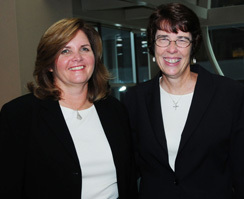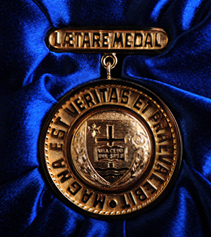
Sister Mary Scullion, R.S.M., and Joan McConnon, co-founders of Project H.O.M.E., an organization devoted to ending homelessness in Philadelphia, will jointly receive the University of Notre Dame’s 2011 Laetare Medal, the oldest and most prestigious honor given to American Catholics, at Notre Dame’s 166th University Commencement ceremony May 22 (Sunday).
“In their work for the homeless of Philadelphia, Sister Scullion and Joan McConnon have splendidly answered the Gospel summons to brotherly love,” said Notre Dame’s president, Rev. John I. Jenkins, C.S.C. “Serving the unsheltered Lord on the streets of their hometown, they have provided an example for others to serve likewise in cities worldwide.”
The daughter of Irish immigrants, Sister Scullion, Executive Director of Project H.O.M.E., was graduated from St. Joseph’s University and entered the Sisters of Mercy in 1976. She earned a master’s degree in social work from Temple University in 1986.
Joan McConnon, associate executive director and chief financial officer of Project H.O.M.E., is a graduate of Pennsylvania State University who earned a master’s degree in taxation from Drexel University in 1989. Before returning to Philadelphia to work for the homeless, she worked for six years as an accountant at GTE and Corning Glass.
Sister Scullion and McConnon, both Philadelphia natives, founded Project H.O.M.E. (an acronym for Housing, Opportunities for Employment, Medical Care, and Education) in 1989, first providing emergency shelter for some 50 homeless men, then forming a community and establishing more permanent supportive residences for chronically homeless men and women who sought food, clothing, medical care, employment and a sense of dignity.
The project has grown dramatically, now including 480 units of housing and two businesses which provide employment to formerly homeless people. Recognized as a national model, Project H.O.M.E. also engages in community development in a low-income Philadelphia neighborhood, including renovation of inner city vacant lots, economic development, home-ownership initiatives for working poor families, and education and employment programs for youth and adults. Of the homeless people participating in its programs, 95 percent have not returned to the streets, and it is widely credited for having reduced Philadelphia’s homeless population by half. Notre Dame’s Summer Service Learning Program has sent undergraduate student volunteers to serve in Project Home since 1999.

The Laetare (pronounced Lay-tah-ray) Medal is so named because its recipient is announced each year in celebration of Laetare Sunday, the fourth Sunday in Lent on the Church calendar. “Laetare,” the Latin word for “rejoice,” is the first word in the entrance antiphon of the Mass that Sunday, which ritually anticipates the celebration of Easter. The medal bears the Latin inscription, “Magna estveritas et prevalebit” (“Truth is mighty, and it shall prevail.”)
Established at Notre Dame in 1883, the Laetare Medal was conceived as an American counterpart of the Golden Rose, a papal honor which antedates the 11th century. The medal has been awarded annually at Notre Dame to a Catholic “whose genius has ennobled the arts and sciences, illustrated the ideals of the Church and enriched the heritage of humanity.”
Among the 133 previous recipients of the Laetare Medal are Civil War Gen. William Rosecrans, operatic tenor John McCormack, President John F. Kennedy, Catholic Worker foundress Dorothy Day, novelist Walker Percy, Cardinal Joseph Bernardin, labor activist Monsignor George G. Higgins, and jazz composer Dave Brubeck.